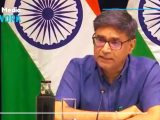
Human Rights Day Appeal for Justice and Self-Determination from Kashmiris
December 10, 2024As the world marks Human Rights Day, Kashmir’s call for justice grows louder, demanding international action to end its prolonged suffering under Indian occupation.
On the occasion of Human Rights Day 2024, Volker Turk, the UN High Commissioner for Human Rights, emphasized the importance of human rights as a critical force for preventing conflict, protecting dignity, and promoting transformative solutions in times of crisis. He stressed that human rights are not abstract ideals but provide concrete laws and frameworks that prevent abuse, ensure dignity, and uphold respect for all individuals. However, despite these noble ideals, the situation in Indian Illegally Occupied Jammu and Kashmir (IIOJK) remains a clear contradiction.
Dr. Ghulam Nabi Fai, Chairman of the World Forum for Peace & Justice, highlighted the United Nations’ failure to prevent or resolve conflicts, particularly the long-standing dispute over Kashmir. While the Universal Declaration of Human Rights (UDHR) sets out essential principles, Fai pointed out that these ideals are applied selectively, often disregarding the aspirations of oppressed peoples like the Kashmiris. The UN’s inability to act impartially in Jammu and Kashmir has left the region suffering under India’s occupation for over seven decades, with no meaningful resolution in sight.
Fai echoed UN Secretary-General Antonio Guterres’ dire warning on December 6, 2024, stating that human rights are under siege globally, with conflicts intensifying and international law increasingly ignored. On Human Rights Day, Kashmiris’ call for international intervention in IIOJK gained urgency. He proposed that the UN appoint a special envoy to Kashmir and ensure the genuine political voice of the Kashmiri people is included in any discussions about their future.
The crux of the Kashmir conflict is not territorial but about the people’s right to self-determination. A solution imposed without the consent of the Kashmiri people will only perpetuate instability. Fai emphasized that impartial international observers would recognize the Kashmir cause as a legitimate struggle based on democratic values, the rule of law, and international justice.
The plight of the Kashmiri people cannot be ignored any longer. India’s continued violations of international law must be addressed. As a signatory to the UDHR, India has an obligation to uphold human rights, yet it has systematically denied the Kashmiri people their most basic rights, including the right to self-determination.
Fai made it clear that the demand of the Kashmiri people is simple: freedom from military occupation and the right to decide their future through a democratic vote, as defined by the United Nations Security Council. The international community must pressure India to implement this solution and ensure the will of the Kashmiri people is heard. Only then can peace, stability, and human rights be restored not only in IIOJK but throughout the South Asian region, home to one-fifth of the world’s population.

